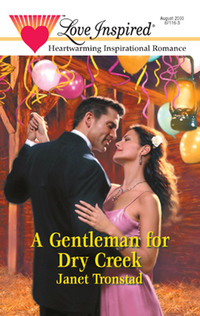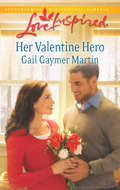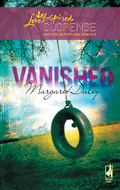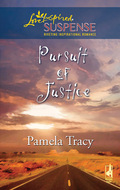Das Buch kann nicht als Datei heruntergeladen werden, kann aber in unserer App oder online auf der Website gelesen werden.
Buch lesen: "A Gentleman for Dry Creek"
“I’d never hurt you.
“You don’t need to be afraid of being close to me,” Garth said.
Lord, he must think I’m a ninny. I’m not afraid of him.
It took a moment for the realization to sink even further into Sylvia’s mind. She checked the nerves in her stomach. Yes, she thought, she was not scared of Garth. It must be that she had just never been forced to live with her fears long enough to conquer them before. She’d never had to sit in a man’s lap until the trembling stopped. That must be it.
It must be. Because the alternative—that she had special feelings for Garth that made her fears disappear—that maybe she was even a little bit in love with the man—was starting up a trembling all of its own. And this trembling rocked her to her foundations.
JANET TRONSTAD
grew up on a small farm in central Montana. One of her favorite things to do was to visit her grandfather’s bookshelves, where he had a large collection of Zane Grey novels. She’s always loved a good story.
Today, Janet lives in Pasadena, California, where she works in the research department of a medical organization. In addition to writing novels, she researches and writes nonfiction magazine articles.
A Gentleman for Dry Creek
Janet Tronstad

And it shall come to pass in the day that the Lord shall give thee rest from thy sorrow, and from thy fear, and from the hard bondage in which thou wast made to serve.
—Isaiah 14:3
Dedicated with love to my two sisters, Margaret Enger and Doris Tronstad. How fortunate I am to have both of you in my life.
Dear Reader,
I hope you enjoyed the story of Sylvia and Garth. I wanted to show a woman who—like most of us—has struggled with fear in her relationships. It would have been easy for Sylvia to listen only to those fears. But, in doing so, she’d have missed out on the gift of love Garth was offering.
If you have similar fears in your life, I pray you will not let them stop you from accepting the love of others, whether it be the love of a friend, a family member, or the love of that special man. In the beginning of the book, I chose the words of Isaiah 14:3 to remind us that God can give us rest from our fears. Once our fears have been put to rest, we can accept the gift of love and friendship others have for us.
May we all love well and fearlessly.

Contents
Chapter One
Chapter Two
Chapter Three
Chapter Four
Chapter Five
Chapter Six
Chapter Seven
Chapter Eight
Chapter Nine
Chapter Ten
Chapter Eleven
Chapter Twelve
Chapter Thirteen
Chapter Fourteen
Epilogue
Chapter One
Sylvia Bannister checked the rearview mirror, not because there was likely to be any traffic on this one-lane road outside of Miles City, Montana, but because she had anxiously checked the mirror every few minutes all the way here from the airport in Billings. Between checking the mirror and praying, she didn’t notice that the snowflakes were falling thicker and the temperature was dropping.
She was worried. She kept expecting a pulsing red light to fill the back window of her rental car. She’d asked the police to flag her down if they found out anything new about K.J. and John—anything at all.
But the window stayed dark except for the snow that gathered around the edges. The two boys could be anywhere between here and Dry Creek, Montana. And they probably didn’t have warm jackets with them. Or anything more substantial than a candy bar to eat. And certainly not a map—Sylvia stopped herself. The two boys would be fine. They’d faced tougher odds on the streets of Seattle. The teenagers were two of the gang members her center was pledged to help. She’d had such hopes for these two boys. She knew their background—in one of the deadliest gangs in the area—but she knew kids and she’d pinned some hopes on these two.
That’s why, when she’d found out they had been offered money to kill someone in Dry Creek, Montana—and then had bought plane tickets to Billings—she barely had time to activate the center’s prayer chain before she rushed to the airport, flew to Billings and then rented this car to drive the rest of the way.
She’d chase those two boys to the ends of the earth if that’s what it took to snatch them back from a life of crime.
She looked in her rearview mirror again. She wondered just how far away Dry Creek, Montana, could possibly be. She’d driven down Interstate 94 and turned off at the exit that said Dry Creek. It was dark outside, but her headlights had shown the sign clearly. She couldn’t have made a mistake. Still, she’d expected to be in Dry Creek by now. So far, she hadn’t seen any buildings, and the road she was driving on was little more than a path over a washboard of foothills.
Sylvia opened the window and a fine flurry of snow blew in her face. She loved the soft touch of snow. Besides, the wet coldness of the flakes kept her awake. She was sleepy. She didn’t realize she didn’t have a firm grip on the car’s wheel until she was jarred by a bump in the road and automatically swerved. With all the snow it was hard to tell, but she felt like she hit something. She was on the bank of an old creek bed and she needed to pull the car back on the path. She twisted the wheel, but the car spun to the right. Something was wrong. Then she realized the something she hit must have had a sharp point to it. She had a flat tire.
She pulled harder, but the red Buick was already tilting. She couldn’t control it. She was going down the bank. She barely had time to whisper a prayer as she tipped. She felt a stabbing pain as her head hit the windshield.
Her last thought was that she’d freeze to death if no one found her soon.
And who would find her? It was four o’clock in the morning and she hadn’t seen another car for twenty long miles.
Dear Lord, what have I done?
Garth Elkton sat crouched down in the cab of his ranch pickup and peered out his window at the Buick Skylark. Someone had driven the car right down the side of the creek bed and lodged it into a snowdrift.
Looked like a fool’s mistake.
Trouble is, there weren’t that many fools around Miles City. Not with the tourists all down in California at this time of year. Even drunks had better sense than to venture out in the middle of winter—and if they did, they didn’t end up in his cow pasture half-buried in a snowdrift.
No, something wasn’t right.
The early-morning light was still hazy, so he carefully checked the snow-covered ground in all directions. He was looking for boot marks or hoof prints. Rustlers had been hitting this part of Montana, and he’d even heard rumors of contract killers coming into the Billings airport yesterday.
But there were no prints around the car. He didn’t see anything but frostbitten sage and, in the distance, the low rolling hills of the Big Sheep Mountain range. He could make out the smoke coming from the fire in one of the bunkhouses on his ranch and he sighed. He should be home with his feet propped up in front of the fire having a second cup of coffee.
Instead he’d come out to be sure all the cows made it to the storm shelter last night, and here he was. Trying to decide what kind of trouble that red car was going to be.
He studied the car. Most likely it was empty. Failing that, however, it was a trap set by the rustlers. Whoever drove that car into the creek bed knew someone passing by couldn’t resist walking over and taking a look inside. Not after a brittle winter night like last night. Because—if the car wasn’t empty—it meant some poor fool needed help desperately.
Well, he might as well get it over with. He reached under the seat. He’d feel a lot more comfortable with a weapon of some sort. He usually had more tools there, but all he found was one old hammer. He’d picked up the hammer in a ditch a month or so ago when he was out mending fences.
Garth eyed the hammer doubtfully. He’d heard of men who could kill someone with a dinner fork, but he doubted even they could do much with this hammer. The wooden handle was splintered and the metal was rusty. It looked like it’d crumble with the first blow. Not that he needed to worry about giving a second blow anyway if the men inside the car were packing guns. He’d be finished before he began.
Garth opened his cab door cautiously. A light filter of snow was falling and the weather was so cold, Garth’s breath hung around him like smoke. He hefted the hammer in his bare hand as he walked low, gliding from sagebrush to sagebrush.
Garth half slid along the ground when he got closer to the car. The snow was cold on his stomach, but he hardly noticed.
The window of the Skylark was steamed up but Garth could see a shape. It could be a bundle of blankets. Or it could be a man.
A soft moan came from inside the car.
This is it, Garth said to himself. He took a deep breath, rose to his full height, hefted the hammer and opened the car door all in one swift movement. Garth was braced for the blast of a rifle, but not for the shrill scream that shook his earlobes.
He dropped the hammer on his toes.
“What the—” He swore until the small face in front of him blinked and then opened up a pair of eyes so blue, he couldn’t believe they were real.
How in the world had she gotten eyes the color of polished turquoise? Garth shook himself. Forget her eyes, old man. Remember where you are. She could be a criminal. Rustlers wouldn’t hesitate to use a pretty woman as bait. “What are you doing here?”
Sylvia looked up at the man. He was standing with his back to the rising winter sun. Flecks of snow clung to the gray Stetson that kept his face in shadows even though it was early morning. The hat was worn and dipped to shield his eyes like it had been trained for the task. He was tall, six foot two or three she’d judge, and sturdy.
She shivered a little from the sheer size of him. Big men made her nervous, not that she ever let them see it. With dogs and big men, she needed to keep her nerve up.
He was angry—she could see that. His face was red with anger even in the cold. But then she saw that his eyes didn’t squint the way a mean man’s eyes would. She had become expert at reading anger on a man’s face. At least her ex-husband had done that much for her.
“What?” Sylvia tried to listen to the man. She felt like she was coming out of a sleep. Something important had happened and she couldn’t remember what it was. Maybe this man knew. She’d driven so far and so fast, she felt as if she was still moving. Then she felt the pain in her head and she remembered—the accident, the twisting of her shoulder, the impact on her head and then the blackness.
“What are you doing here?” the man repeated, and then paused. “Are you working with the rustlers?”
“No,” Sylvia whispered. Her head was pounding. “I’m working with the—”
“The what?”
“The gang.” Sylvia didn’t know why her tongue was so thick. “The boys in the gang.”
The pain in Sylvia’s head twisted and she saw white…
Sylvia woke later to the sound of voices. There was a man’s voice. The big man. She remembered him. His voice sounded like a low rumble. Then there was an old man’s voice, raspy and quiet. Over it all, a woman’s voice soothed them.
“She’s coming round,” the old voice said with assurance.
Sylvia opened her eyes. She was in a Norman Rockwell painting. A white-haired man with a stethoscope around his neck was beaming down at her. A sweet-faced woman with her hair pulled back was looking around his shoulder and beaming, too.
Behind her she saw the big man. He must not have heard of Norman Rockwell. Instead of a smile he wore a scowl. “Give her room to breathe.”
“I’m fine,” Sylvia mouthed the words. They squeaked out softer than she wanted so she took a breath and tried again. “I’m fine.”
“You’re sure she doesn’t need to be in the clinic?” The big man kept talking about her like she wasn’t there. She noticed his gray jacket was still damp from melted snow. “I can take her to Miles City easy enough—the roads aren’t that bad.”
Mention of the roads reminded Sylvia. “I’ve got to go.” She started to sit up.
“You’re not going anywhere,” the woman said firmly, turning to the big man. “Is she, Garth?”
“Garth.” Sylvia rolled the name around on her tongue. She liked it. Even if he had a wife. “Thank you—all of you—but I need to leave.”
Sylvia slowly raised herself completely. She’d been lying on a plaid sofa in a high-ceiling living room. Huge windows opened onto a snow-dusted outdoor deck.
“What do I owe you?” Sylvia looked at the doctor. Doctors in Seattle didn’t make house calls, but if one did it’d be expensive. She wondered how much cash she had with her.
“No need for that.” The old man waved away her offer. “I was out here anyway—the boys had a horse that needed a look-see.”
“A horse?”
“I tend to all of God’s creatures,” the old man said with a smile. “Don’t worry. I went to medical school. Only took up vetting in my later years. Not that you’re complicated. A vet could tell you what you need to know. Take it easy, don’t doze off, someone to watch you—that sort of thing. But don’t worry. Francis will look out for you.”
“Thanks, but—” Sylvia took a ragged breath and swung her legs around so she’d be sitting normally. The room started to spin.
“What the—” Garth stepped to the other side of the sofa where Sylvia was sitting, and grabbed her shoulders. “Fool woman. Don’t you listen to the doctor?”
Sylvia felt the man’s hands on her shoulders. She wanted to shrug them off, to show she didn’t need help. But even she could tell that without his support she’d fall over like a rag doll.
“I need to get to Dry Creek.” Sylvia said the words distinctly. Carefully.
“Whatever it is, it can wait,” Garth said, eyeing her. What he saw stopped him. Pain stretched the pale skin of her face and her startling blue eyes half closed with the effort of breathing. He could feel every breath she took through his hands as they held her shoulders.
When she’d passed out in the car he’d been alarmed at her stillness. He’d put his cheek close to her lips to feel the warmth of her breath. He wanted to do the same again. Even though Dr. Norris said there were no broken ribs, he was sure there were some bruised ones. She wasn’t breathing right.
“No, it can’t. Life and death—”
“Death! Oh, surely not,” the doctor sputtered as he patted her knee. “That much of a doctor I’ve always been. No, you’re not going to die—a concussion maybe, but that’s it.”
Sylvia wondered why the doctor’s hands felt merely comforting while Garth’s hands on her shoulders felt like an anchor. Her muscles settled into the palms of his hands and she leaned slightly. She’d rest a minute before she stood. “It’s not me—it’s Glory Beckett.”
“You’re with her?” Garth demanded. “She’s the one who’s mixed up with those contract killers I’ve heard about.”
“I—I can explain,” Sylvia said as she took another partial breath.
“Explanations can wait,” Garth said. He didn’t like the whiteness in the woman’s face now that she was sitting. And he could feel the effort her body spent in drawing each breath. He’d taken off her coat when he’d first laid her on the sofa. Nothing separated him from her skin but the white silk blouse she was wearing. The material was cool and sleek, but he could feel her warmth beneath the material. Yes, explanations could wait. He’d just as soon hold this butterfly of a woman a minute or two longer before he found out what was making her so worried.
Chapter Two
Six weeks later, on a side street in Seattle
Garth Elkton figured he was the sorriest excuse for a man alive. He’d let his butterfly woman fly right out of his life and he’d been too tongue-tied to stop her. The fact that she was avoiding him at the time—and had avoided him most of the two days that she spent in Dry Creek—should not have stopped him.
You’d have thought it was his fault she hadn’t known those two boys had come to Dry Creek to save Glory Beckett instead of shoot her and that Glory Beckett had ended up helping the Feds cut off the distribution network for the stolen beef that was being rustled out of Montana. He had not known those things himself. He couldn’t have told Sylvia.
But that didn’t ease her coldness to him. As near as he could figure, Sylvia had been annoyed with him just for breathing the same air as everyone else. A sane man would give up on a woman so set against him. At first he’d thought it’d been the confusion about Francis. But he’d told her Francis was his sister. It hadn’t seemed to make a difference.
He told himself a dozen times he should forget her.
Still, he tapped his shirt pocket. Sylvia had lost a butterfly-shaped, gold earring when she rode in his pickup the morning he’d found her. He hadn’t noticed it until after she left Dry Creek. He’d meant to mail it to her in Seattle, but he’d found he was reluctant to part with it. He kept hoping she’d write and ask about it. But she didn’t.
He glanced down at the faded Polaroid picture that he’d taped to the dash of his pickup—he’d given Santa five bucks to take that picture of Sylvia on Christmas Eve and it was the best five bucks he’d ever spent. She’d been talking to the kids serving the spaghetti dinner that night in Dry Creek and her face was alive with laughter. Her smile had haunted him ever since she climbed into Glory Beckett’s Jeep and headed back to Seattle.
At the time, he’d thought his yearning for her would fade. He didn’t know her. He knew that. The shadows of emotions that had chased themselves across her face when he talked to her could be misread. But he had an itch inside his gut to know Sylvia Bannister, and he figured the only way to get rid of it was to do something about it.
He didn’t have a plan past returning the earring. A man needed hope to have a plan and he didn’t have any of that. Sylvia Bannister had made it clear she was a church woman and he figured a church woman would never take up with the likes of him. But plan or no plan, hope or no hope, it seemed the best way to start was to go to Seattle.
And here he was. Lost as a stray sheep on some wet Seattle street. Or maybe he was even in Tacoma. He’d dropped Matthew Curtis off so the man could do his own courting of Glory Beckett. Garth had thought he’d find Sylvia’s youth center with no problem. He’d flown missions in the army with a flashlight held to a map the size of a baseball card.
But the streets here were confusing. Too many hills and detours. Too many gang markings covering street signs. Too many empty, shelled buildings with the street numbers erased off their sides. He knew he wasn’t in the safe part of town and he didn’t like the thought of Sylvia’s center being here.
And then he saw a familiar face. One of the kids. John. The kid was half walking, half running down the street beside an abandoned building. Gray metal sheets were nailed over the windows of the building and rust outlined the doorway. Garth guessed the building used to be a factory of some kind.
Then he noticed that John’s face was as gray as the weathered sheet metal. The kid was afraid, looking over his shoulder and trotting along like some lopsided chicken.
Garth pulled over and parked his pickup. He was going to call out to John when he saw what was happening. Kids—thugs, Garth thought—were coming toward John from all directions. Instead of running faster, John slowed down like it was hopeless.
Garth reached over and opened the passenger door of his pickup truck. John could make it to the pickup if he gave one good burst of speed. Garth honked the horn and John looked up but didn’t move. Garth had seen this before. Someone so scared they couldn’t move even to save themselves.
Garth half swore. He’d have to do this the hard way. He opened his door and reached behind the seat for an old bullwhip he’d bought at an auction last week. The Gebharts were selling out and he’d paid as much for the whip as their pride would allow. At the time he wasn’t sure it’d stay together long enough for him to nail it to his barn wall.
Now he hoped the whip would hold together a bit longer than that.
Sylvia stopped her fingers from twisting together nervously. She was sitting behind her desk in the small office at the center. The other staff—Melissa Hanson and Pat Dawson—were conspicuously absent. Cowards. They were no more prepared to chat with Mrs. Buckwalter than she was.
At first she’d felt like Alice in Wonderland when Mrs. Buckwalter had called, asking to see the center. Sylvia knew of the Buckwalters. True, she never traveled in those financial—or social—circles, but she knew they existed. Just like she knew the queen of England existed. She’d just never expected to have the queen—or Mrs. Buckwalter—for tea.
The Buckwalter Foundation was not the kind of donor that usually supported the center—in fact, they were more likely to donate millions to a Seattle museum than ten dollars to a small, church-funded youth center that needed a camp.
Of course, she’d be happy to show Mrs. Buckwalter around. She’d smiled into the phone in frozen shock. Today? Yes, four o’clock would be fine.
Sylvia wasn’t off the phone for two seconds before she realized something was very wrong. She had assumed somehow in those magical minutes that someone from the staff had approached the Buckwalters about their ideas for a youth camp. The funding they had counted on had fallen through at the last minute and her first wild hope was that somehow word had gotten to the Buckwalters and they were coming to their rescue.
She realized how naive that sounded the moment she thought about it. A lion in the jungle didn’t worry about whether or not an ant had funding. She didn’t even know anyone who knew the Buckwalters well enough to get past the army of secretaries that fielded their calls. They were notorious for being difficult to contact.
Her fears were confirmed when she questioned the staff. No one had called Mrs. Buckwalter. No one even knew how to reach Mrs. Buckwalter.
That’s when Sylvia panicked. The phone call had not been a miracle—it had been a mistake. Mrs. Buckwalter must have thought she was calling someplace else. She must have looked in the phone book under Tacoma-Seattle Youth Center and dialed the wrong place.
Sylvia took a deep breath. So it wasn’t perfect. It was still a slim hope and that was better than anything else she had. After all, Jesus was an old hand at drawing a rabbit out of a hat. He had fed five—or was it ten—thousand with a few biscuits and a couple of fish fillets. If he could do that, he could help her with Mrs. Buckwalter.
Sylvia braced herself. Yes, she’d do her best pitch. She had the grant proposal. She needed to make some changes and it would be ready. Then all that remained was—
Oh, no, the office! Or more like the nonoffice. Sylvia used the room that had once been a janitor’s storage room. The room met her needs but it still smelled of floor wax. She’d always kept lots of green plants around, but surely a woman like Mrs. Buckwalter would expect more to sit on than a gray folding chair.
And her clothes! Sylvia looked down at herself. Usually she wore a suit when meeting with prospective donors. But today she had on a bulky navy sweater and acid-washed jeans. There wasn’t time to drive back to her apartment and change.
Sylvia took a deep breath and reminded herself what Jesus could do with a biscuit. That reminded her—yes, tea. She needed a pot of tea and some English biscuits.
By four o’clock the tea was cooling in the cups and Sylvia’s glow was fading by the second. Mrs. Buckwalter certainly wasn’t interested in the proposal Sylvia had managed to get ready.
“—we’d pair each teen with a mentor.” Sylvia pressed forward with her proposal because she didn’t know what else to do. Mrs. Buckwalter still held her purse in her lap. The purse was genuine leather and the lap was ample. Sylvia had seen Mrs. Buckwalter at a distance in several local charity events and thought she looked imposing. Up close she looked downright intimidating. English tweed suit, hand-tailored for her. Starched blouse. Iron hair, severely pulled back. Intelligent green eyes that seemed impatient.
Mrs. Buckwalter looked at the diamond watch on her wrist.
Sylvia gave up. Mrs. Buckwalter must have realized the mistake early on and was just waiting for enough minutes to pass so she could politely leave. She obviously wasn’t used to this part of town. There must be thirty carats of diamonds on that watchband alone. “You shouldn’t wear your good watch down here.”
Mrs. Buckwalter looked up blankly. “I didn’t.”
“Well, it would be the watch of a lifetime for any of the kids down here,” Sylvia said dryly. “We try not to wave temptation in front of them.”
Mrs. Buckwalter nodded and slowly unhooked her watch. Then she laid the watch out beside the teapot. “It’s yours.”
“But I didn’t mean for you to—”
“I know.” Mrs. Buckwalter waved aside her protest. “I’m an old woman and I don’t have time to be subtle. Don’t know what made me think I might be able to pull this off slowly. Let me put it to you straight. I’ll fund this camp of yours but I have one condition—I pick the campsite, no questions asked. If you have a problem with that—”
“No, no—” Sylvia was speechless. She started to rise out of her chair. Could it really be that simple?
“We’ll need at least a hundred and fifty thousand dollars,” Sylvia clarified. She wasn’t sure Mrs. Buckwalter had been paying attention.
Mrs. Buckwalter nodded complacently. “We’ll probably want to make it two hundred thousand dollars, plus whatever the watch brings. I never liked it anyway. I want to be sure they have the best of everything. Not that it’s necessary for learning good manners, but it helps.”
Sylvia half choked as she sank lower into the folding chair. “Manners?” She was right. Mrs. Buckwalter hadn’t been listening. She had them confused with some other youth center. Maybe one of those upscale places that prepares girls to be debutantes.
“We work with young people who have been in gangs,” Sylvia offered quietly as she got up and walked over to a locked cabinet and turned a key. She pulled the drawer open to reveal a jumble of knives, cans of spray paint and bullets. Each item had a tag. “These are only from the past month. Kids give them to us for a month at a time. We hope that at the end of the month they’re ready to give up the stuff forever. Usually they do. Sometimes they don’t. Either way, they know fear every day of their lives. They see other kids killed. They’ve all robbed someone. They need more than manners.”
Mrs. Buckwalter looked at the drawer and raised an eyebrow. “Well, if you’re set on it, you’re welcome to add the prayer and Bible stuff I hear you’re famous for—I don’t believe it will harm anyone. But you’re to include a proper amount of old-fashioned manners, too. I don’t care how violent these children have been—we are a civilized nation and manners will do them good.”
“You don’t mean table manners? Salad forks—that kind of thing?” Now that Sylvia concluded Mrs. Buckwalter knew where she was and what she was saying, she tried to sort the thing out. Was “manners” a code name for some new therapy she hadn’t read about yet? Some kind of new EST thing—or maybe Zen something. Mrs. Buckwalter didn’t look the type to go in for psychological fads, but she must be.
“And everyday etiquette, too,” Mrs. Buckwalter added complacently. “Respect for elders. Ladies first, boys opening the door for girls—that kind of thing. Maybe even wrap it up with a formal dance.” Mrs. Buckwalter’s face softened. “I’ve always thought there’s nothing like a formal dance to bring out the manners in everyone.”
Sylvia felt as if her head was buzzing. Most of the kids she worked with had probably never seen a dance more formal than the funky chicken. And if a boy opened the door for a girl, she wouldn’t go through it, suspecting he was using her as a body shield to stop bullets from someone on the other side of it.
“But—” Sylvia started to explain when she noticed that Mrs. Buckwalter was no longer listening to her. Instead, the older woman had her head tilted to the outer room. Things were getting a little noisy, even for the center.
“Excuse me,” Sylvia said. She’d worry about manners later. “I’d better check and see what’s happening.”
The thud of a basketball sounded as it hit the wire hoop in the main, gymlike room of the center, but no one even looked as the ball circled the hoop before slowly dropping through the basket. The two teenage boys, who had been shooting baskets, had their backs to the hoop. They stood frozen, half-crouched, undecided about whether to run or to hit the floor as the front door slammed open.
Sylvia scanned the big room in a glance. The air was humid; it’d been raining off and on all day. Sometimes the weather made everyone short-tempered. But it wasn’t the weather today. She saw the two boys in the middle of the floor and three or four girls sitting on the edge of the floor where they’d been gossiping.
All of the kids were staring at the front door. And she couldn’t blame them. A large figure was shouldering its way inside. If they were anywhere else, Sylvia would say it was a bear. Or Bigfoot. But then she saw that the figure had two parts. John was slung over the shoulder of a man as big as a mountain. She could already hear the squeal of rubber as a car screeched to a stop outside.








